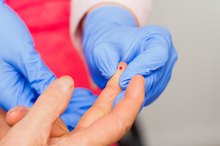Will Increased Salt Cause a Diabetic's Blood Sugar to Go Up?
Diabetes is one of the fastest growing health concerns in our nation. In 2010, an estimated 18.8 million Americans were diagnosed with diabetes and another 7 million were considered "prediabetic," according to the Centers for Disease Control and Prevention 1. If you are a diabetic you are also at risk for developing cardiovascular disease and other serious health complications. Learning what foods will raise blood sugar is an important first step in managing your diabetes.
Foods and Blood Sugar.
Food is divided into three categories -- proteins, fats and carbohydrates -- that provide us with calories and energy. Our bodies need all of these nutrients to function properly. However, carbohydrates are the only sources that have a direct effect on blood sugar.
Salt
What Happens to Sugar Levels in the Blood While Fasting?
Learn More
In addition to providing us with energy, food also provides us with vitamins and minerals. Salt is considered a mineral, and while it has many functions in the body, it does not have an effect on blood sugar. However, eating a salty food such as pretzels or potato chips may raise your blood sugar because these foods contain starch – or carbohydrate. But it is the carbohydrate that is raising your blood sugar, not the salt.
- In addition to providing us with energy, food also provides us with vitamins and minerals.
- However, eating a salty food such as pretzels or potato chips may raise your blood sugar because these foods contain starch – or carbohydrate.
Carbohydrates
Any food that has starch, sugar or fiber may be considered a carbohydrate. This would include:
- foods such as rice
- bread
- pasta
- crackers
- natural sugars such as those in fruit,
- added sugars such as those in desserts
Any type of carbohydrate will raise your blood sugar.
Blood Pressure
Can Diabetics Eat Rye Bread & Pumpernickel Bread?
Learn More
While salt does not raise our blood sugar, too much salt can raise your blood pressure. A person with diabetes should work to keep his blood pressure at 130/80 or lower. This will help reduce the risk for cardiovascular disease, stroke, and other complications. When you make healthy meal choices you can help control your diabetes and overall state of health.
- While salt does not raise our blood sugar, too much salt can raise your blood pressure.
- A person with diabetes should work to keep his blood pressure at 130/80 or lower.
Related Articles
References
- Centers for Disease Control and Prevention: Diabetes Public Health Resource
- Diabetes mellitus: The epidemic of the century
- Approaching pre-diabetes - PubMed
- FoodData Central
- FoodData Central
- FoodData Central
- Sugar-Sweetened Beverage but Not Diet Soda Consumption Is Positively Associated with Progression of Insulin Resistance and Prediabetes
- Added Fructose - Mayo Clinic Proceedings
- Fructose and sugar: A major mediator of non-alcoholic fatty liver disease - Journal of Hepatology
- Consuming fructose-sweetened, not glucose-sweetened, beverages increases visceral adiposity and lipids and decreases insulin sensitivity in overweight/obese humans
- Consumption of fructose-sweetened beverages for 10 weeks reduces net fat oxidation and energy expenditure in overweight/obese men and women
- Trans fatty acids in diets act as a precipitating factor for gut inflammation? - Okada - 2013 - Journal of Gastroenterology and Hepatology - Wiley Online Library
- Role of free fatty acids in endothelial dysfunction | Journal of Biomedical Science | Full Text
- Metabolic Implications of Dietary Trans‐fatty Acids - Dorfman - 2009 - Obesity - Wiley Online Library
- Trans fatty acids, insulin resistance and diabetes | European Journal of Clinical Nutrition
- Trans fatty acid intake is associated with insulin sensitivity but independently of inflammation
- Trans Fat | FDA
- Small Entity Compliance Guide: Trans Fatty Acids in Nutrition Labeling, Nutrient Content Claims, and Health Claims | FDA
- Dietary Carbohydrate (Amount and Type) in the Prevention and Management of Diabetes | Diabetes Care
- Prediction of the Relative Blood Glucose Response of Mixed Meals Using the White Bread Glycemic Index | Diabetes Care
- The postprandial glucose response to some varieties of commercially available gluten-free pasta: a comparison between healthy and celiac subjects - PubMed
- Diabetes, Depression, and Cognition: a Recursive Cycle of Cognitive Dysfunction and Glycemic Dysregulation | SpringerLink
- Impact of Dietary Fiber Consumption on Insulin Resistance and the Prevention of Type 2 Diabetes | The Journal of Nutrition | Oxford Academic
- FoodData Central
- FoodData Central
- FoodData Central
- Impact of yogurt on appetite control, energy balance, and body composition | Nutrition Reviews | Oxford Academic
- Yogurt and Diabetes: Overview of Recent Observational Studies | The Journal of Nutrition | Oxford Academic
- High-Protein Breakfast Induces Greater Insulin and Glucose-Dependent Insulinotropic Peptide Responses to a Subsequent Lunch Meal in Individuals with Type 2 Diabetes | The Journal of Nutrition | Oxford Academic
- FoodData Central
- FoodData Central
- Caffeinated and Decaffeinated Coffee Consumption and Risk of Type 2 Diabetes: A Systematic Review and a Dose-Response Meta-analysis | Diabetes Care
- Effects of carbohydrates on satiety: differences between liquid and solid food - PubMed
- [Relationship between sugary drinks and diabetes of adults in Wuhai city] - PubMed
- Caramel Frappuccino® Blended Beverage: Starbucks Coffee Company
- Iced Starbucks® Blonde Vanilla Latte: Starbucks Coffee Company
- FoodData Central
- FoodData Central
- FoodData Central
- FoodData Central
- Consumption of Honey, Sucrose, and High-Fructose Corn Syrup Produces Similar Metabolic Effects in Glucose-Tolerant and -Intolerant Individuals | The Journal of Nutrition | Oxford Academic
- FoodData Central
- FoodData Central
- FoodData Central
- FoodData Central
- FoodData Central
- Food label accuracy of common snack foods - Jumpertz - 2013 - Obesity - Wiley Online Library
- FoodData Central
- FoodData Central
- FoodData Central
- Fruit juice: just another sugary drink? - PubMed
- FoodData Central
- FoodData Central
- Advanced Glycation End Products, Inflammation, and Chronic Metabolic Diseases: Links in a Chain? - PubMed
- Effects of cooking method, cooking oil, and food type on aldehyde emissions in cooking oil fumes - PubMed
- Fried Food Consumption and Cardiovascular Health: A Review of Current Evidence
- Consumption of Fried Foods and Risk of Heart Failure in the Physicians' Health Study
- Consumption of fried foods and risk of coronary heart disease: Spanish cohort of the European Prospective Investigation into Cancer and Nutrition study
- Consumption of deep-fried foods and risk of prostate cancera,b
Resources
Writer Bio
Andrea Wood has been working as a registered dietitian since 2007, with expertise in nutrition, health and fitness. She earned a Bachelor of Science in dietetics from Michigan State University.









